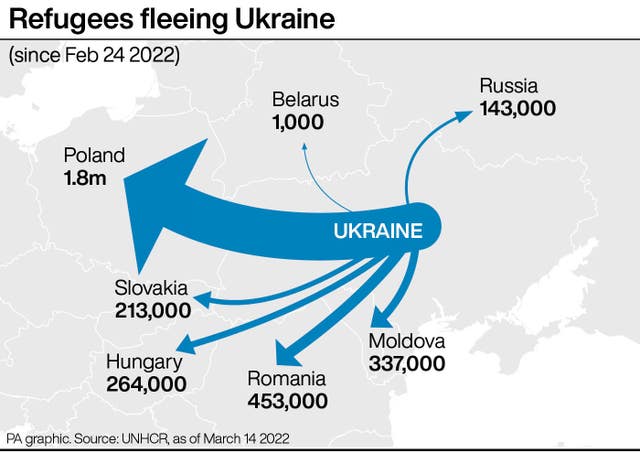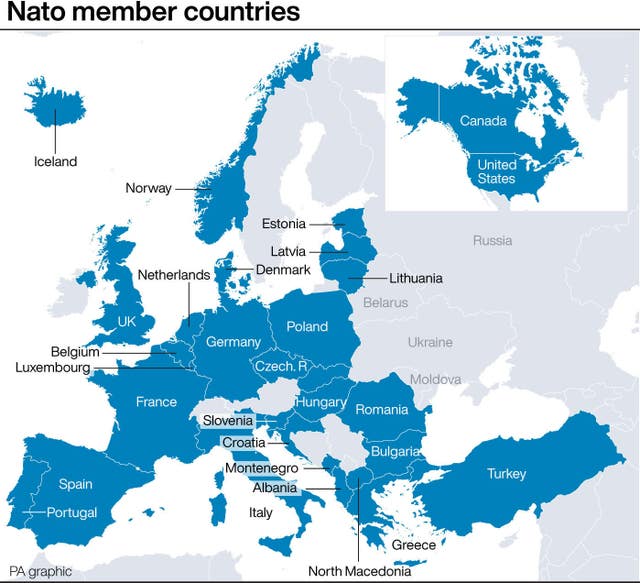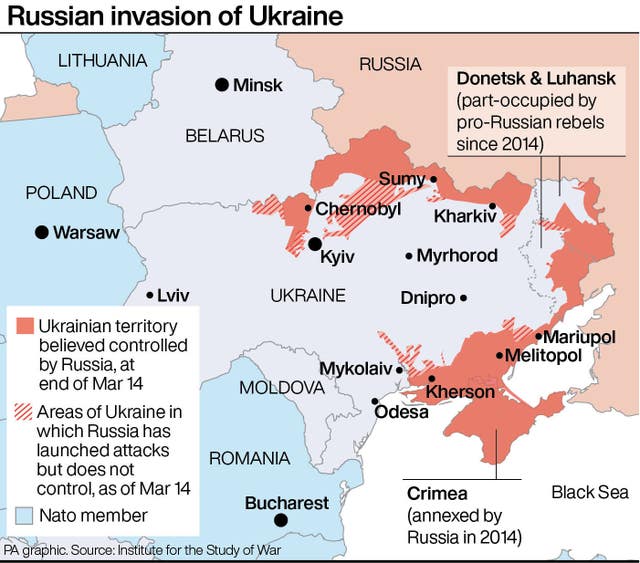
Shelagh Fogarty 1pm - 4pm
15 March 2022, 20:44

Ukrainian President Volodymyr Zelensky said barrages hit four multi-storey buildings in the city and killed dozens of people.
Russia has stepped up its bombardment of Kyiv, smashing apartments and a subway station, while 20,000 people fled Mariupol along a humanitarian corridor in what was believed to be the biggest evacuation yet from the besieged port.
On the diplomatic front, talks between Russian and Ukrainian representatives have become “more constructive”, according to Kyiv, and the leaders of three European Union countries — including Poland, a Nato member on Ukraine’s doorstep — visited the embattled capital in a bold show of support.
With the number of people driven from the country by the war eclipsing three million, large explosions thundered across Kyiv before dawn from what Ukrainian authorities said were artillery strikes, as Russia’s assault on the capital appeared to become more systematic and edged closer to the city centre.

Ukrainian President Volodymyr Zelensky said barrages hit four multi-storey buildings in the city and killed dozens of people. The shelling ignited a huge fire in a 15-storey apartment building and spurred a frantic rescue effort.
The strikes on the 20th day of Russia’s invasion targeted a western district of Kyiv, disrupting a relative calm that had returned after an initial advance by Moscow’s forces was stopped in the early days of the war.
A senior US defence source said the Russians were using long-range fire to hit civilian targets within Kyiv with increasing frequency but that their ground forces were making little to no progress around the country. The official said Russian forces were still about nine miles from the centre of Kyiv.
Ukrainian presidential aide Ihor Zhovkva said Russia has stopped airing demands for Ukraine to surrender, and the Ukrainian representatives felt “moderately optimistic” after the latest talks. Discussions are expected to continue tomorrow.
In a statement that seemed to signal potential grounds for agreement with Moscow, Mr Zelensky told European leaders gathered in London that he realises Nato has no intention of accepting Ukraine.

“We have heard for many years about the open doors, but we also heard that we can’t enter those doors,” he said. “This is the truth, and we have simply to accept it as it is.”
Nato does not admit nations with unsettled territorial conflicts.
The UN said close to 700 civilians in Ukraine have been confirmed killed, but the true figure is probably much higher.
The leaders of Poland, the Czech Republic and Slovenia travelled to Kyiv by train despite the security risks, in a visit EU officials said was not sanctioned by other members of the 27-nation bloc.
“The aim of the visit is to express the European Union’s unequivocal support for Ukraine and its freedom and independence,” Czech Prime Minister Petr Fiala said in a tweet.
He was joined by fellow Janez Jansa of Slovenia and Mateusz Morawiecki of Poland, as well as Jaroslaw Kaczynski, Poland’s de facto leader.

Ukrainian Prime Minister Denys Shmyhal said in a tweet that the leaders had arrived, lauding “the courage of true friends”. He said they were discussing support for Ukraine and further sanctions against Russia.
New efforts to take civilians to safety and deliver aid were under way around the country. The Red Cross said it was working to evacuate people from the north-eastern town of Sumy, near the Russian border, in about 70 buses.
One of the most desperate situations is in Mariupol, the southern city of 430,000 where officials say a weeks-long siege has killed more than 2,300 people and left residents struggling for food, water, heat and medicine.
Kyrylo Tymoshenko, a deputy head of Mr Zelensky’s office, said that 570 out of about 4,000 vehicles that left Mariupol have reached the city of Zaporizhzhia, 160 miles to the north west, while others will spend the night in towns along the way.
Fighting has intensified on Kyiv’s outskirts in recent days, and air raid sirens wailed inside the capital. Mayor Vitali Klitschko announced a 35-hour curfew extending until Thursday morning.
Tuesday’s artillery strikes hit the Svyatoshynskyi district of western Kyiv, adjacent to the suburb of Irpin, which has seen some of the worst fighting of the war.
Flames shot out of the 15-storey apartment building and smoke choked the air as firefighters climbed ladders to rescue people. The assault blackened several floors of the building, ripped a hole in the ground outside and blew out windows in neighbouring apartment blocks. Rescue workers said at least one person was killed.
A 10-storey apartment building in the Podilsky district of Kyiv, north of the government quarter, was damaged. Russian forces also stepped up strikes overnight on Irpin and the north-west Kyiv suburbs of Hostomel and Bucha, said the head of the capital region, Oleksiy Kuleba.
“Many streets have been turned into a mush of steel and concrete. People have been hiding for weeks in basements, and are afraid to go out even for evacuations,” he said on Ukrainian television.
In the east, Russian forces launched more than 60 strikes overnight on Ukraine’s second-largest city, Kharkiv, according to regional administration chief Oleh Sinehubov. The strikes hit the city’s historical centre, including the main marketplace.
Ukraine’s parliament voted to extend martial law for another month, until April 24. Under the measure, requested by Mr Zelenskyy, men between 18 and 60 are barred from leaving the country so they can be called up to fight.